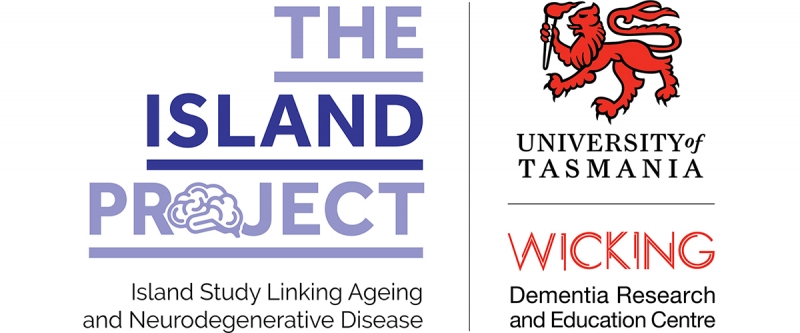| ISLAND Newsletter - August 2020 |
View in browser | Print |
 | | | 
I’m Larissa Bartlett, a postdoctoral researcher at the Wicking Dementia Research and Education Centre and holder of the ISLAND Research Fellowship. I have the great fortune to be working closely with Distinguished Professor Vickers, our Project Team (Helen, Justine and Adam) and a fabulous assembly of researchers. My core focus is on research conducted in the ISLAND Project. Behaviour has a broad and central role in health, and the concept of ‘behavioural medicine’ is something that has long held my interest. It’s well established that unhealthy behaviours lead to disease, but my research has a positive orientation, focusing on things we can do in daily life that help prevent or reduce the severity of disease, increase quality of life and reduce healthcare costs. To this end, I did my Honours and PhD at the Menzies Institute for Medical Research, looking into the effects of mindfulness training on employee stress and mental health. Before I started my medical research career (at the age of 45), I was a sociology and social policy graduate of the University of Sydney with a diverse work history that includes a lot of community engagement. I am fascinated by the drivers of human behaviour, and my work on the ISLAND Project is deepening my understanding of behaviour change theory, and the practical barriers and enablers people experience as they try to implement healthy behaviour recommendations. As you’ll know by now, ISLAND is a 10-year research project that aims to reduce dementia risk by increasing knowledge about – and changing – dementia risk behaviours. Those of you who have already joined our ISLAND research and completed the baseline surveys have provided information that helps us understand your starting point for this long-term project. In the coming months we will ask you to do some cognitive tests and provide some blood samples to supplement your survey data. As the Project progresses we will use these data to build a better understanding of the psychosocial drivers and neuro-biological effects of behavioural approaches to reducing dementia risk. So I would like to take this opportunity to say thank you (very much!) to all of our ISLAND research participants. Your contribution of time and data is incredibly valuable – we absolutely could not do this exciting and ambitious research project without you!
| | Risk Factor - Depression | 
How Can Depression Increase Risk of Developing Dementia?
Depression is one of the risk factors for developing dementia. However, it is also believed to be a possible early symptom of the brain changes that cause dementia. In this regard, it can be difficult to determine whether such related mood and behaviour changes in an older adult are due to a degenerative condition that is part of the earliest stages (prodrome) of dementia, or is more like the mental health challenge that can be experienced at any stage of life. The recently released 2020 Lancet Commission Report on Dementia Prevention, Intervention and Care has examined the most up to date evidence in this area and confirmed that clinically defined depression was a risk factor for dementia, but that a number of uncertainties currently exist. The balance of evidence is that it is depression in later life that mostly contributes to this added risk of dementia. Overall, the increased risk specifically for depression was fairly modest, but when coupled with other potentially related risk factors, such as social isolation, may correspond to a sizeable amount of risk for older people that is potentially modifiable. Core symptoms of clinical depression can be feeling down/low mood, which is severe enough to impact on daily life; poor sleep; low appetite; low energy. To be diagnosed with depression these symptoms must persist for a minimum of two weeks. There could also be changes in behaviour - not wanting to socialise; not enjoying activities that were once enjoyable; excessive consumption of alcohol or relying on sedatives; unable to concentrate. There can be a great deal of variation in depressive symptoms between individuals. Older adults with depression are more likely to show somatic symptoms (e.g. headaches, stomach/bowel complaints, chest pain); younger adults are more likely to experience mental health symptoms (e.g. low mood, irritability). With respect to risk of dementia, there may be a particular role for the stress hormone, cortisol, which can be increased in your body during depression. It is thought that high levels of cortisol over a prolonged period of time may damage the neurons in the hippocampus. The hippocampus is where we lay down new memory and is an area of the brain that is damaged early in Alzheimer’s disease. In this way, long-lasting elevated stress may reduce the ability of hippocampal neurons to withstand the pathology of Alzheimer’s disease. In an area where more research is vital, it is not yet known definitively as to whether treating and/or reducing depression in older adults will lead to decreased risk of dementia. The existing studies on medical interventions, drug treatments, for depression in relation to dementia are mixed – some find a positive benefit, and others don’t. This may be as dementia is often a secondary consideration of the research design for such studies, not the primary focus.
As the research evidence further develops, it does make sense to do as much as possible about managing individual stress, social isolation and depression as this has merit in terms of the impact of such conditions on our daily lives, and may be beneficial in terms of future susceptibility to neurodegenerative conditions that underlie dementia. There are many ways to maintain sound mental, emotional and physical health, including by engaging in stress-relieving activities, such as mindfulness and tai chi. For more information, support and resources, visit the Beyond Blue website and speak with your health adviser, such as your GP.
| | From our members | 
Poems shared
One of our ISLAND members has been writing poems after the passing of his wife last year to Alzheimer's Disease. He has asked to share his work with fellow ISLAND members in the hope you find enjoyment and solace in his words.
Its times like these
Its times like these, When life’s unease. When all around seems only down, When skies are grey, And it rains all day, That my spirit does rise. Paula sits by with her gentle smiles, And holds my heart in life's caress. She gave me more than I can tell. She gave me courage in the face of hell. She gave me strength in times of doubt, She held me steady when all was out. There are no words To describe how she’s missed. She sits with me every day. Consoling, warming when I struggle to stay. I long to join her, to hold her close. One day I’ll do it when I’m morose. With her is where I want to be. Not happy to be a solitary me.
| | | 
Local Tai Chi
Harvard Medical School states that there is a growing body of evidence that Tai Chi - a Chinese martial arts practiced for defence training, meditation and health - has many benefits in treating or preventing many health problems. Whilst research has not yet found if Tai Chi reduces the risk of developing dementia, scientists are finding that, in combination with medical treatment and care, it can help prevent and rehabilitate many conditions commonly associated with age. The slow and deliberate movements, suitable for any fitness level, can benefit balance, flexibility, muscle strength and aerobic conditioning. It is low impact, which is great for joints. The movements relax muscles and promote meditation. Tai Chi/Qigong classes have recommenced in Glenorchy at the Golden Years Club, Glenorchy Monday evenings from 6pm-7:30pm, $7 concession $10 non-concession. Devonport City Council has reinstated Tai Chi for Health classes at the Devonport Recreation Centre - check the website for class times and further details. Find a Tai Chi class near you and experience the benefits of this activity on your body and mind. Harvard Health
| | Research |
 |  |
The science behind why we laugh | Brain research shows the arts promote mental health |
Did you know that you're 30 times more likely to laugh if you're with somebody else than if you're alone? Cognitive neuroscientist Sophie Scott shares this and other surprising facts about laughter in this fast-paced, action-packed and, yes, hilarious dash through the science of cracking up.
TED Talk-Why we laugh | "Mental health issues affect nearly half of the global population, at some point, by age 40. Add to that, recent challenges of the pandemic for maintaining mental wellness, managing fears and uncertainty, and one thing is clear: it’s time to think differently when it comes to how we engage our minds." The Conversation-Art and mental health |
|
| ISLAND Project Partners | |
|  | |
The University of Tasmania received funding from the Australian Government. Views and conclusions expressed in this publication are those of its authors, and may not be the same as those held by the Department of Health.
|
|
Stay Connected:
|


|
islandproject.utas.edu.au
|
| |
|
|